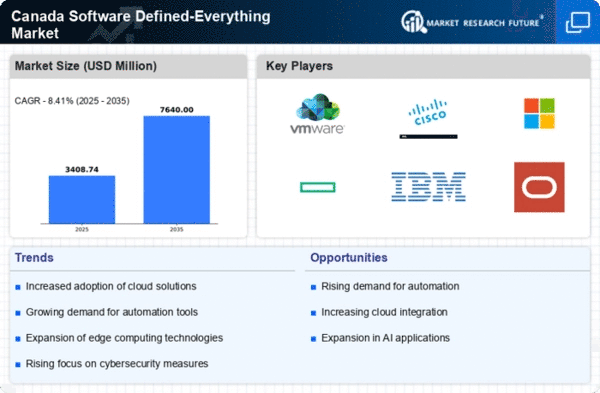Emergence of 5G Technology
The advent of 5G technology is poised to have a transformative impact on the software defined-everything market in Canada. With its promise of ultra-fast connectivity and low latency, 5G is expected to enable a new wave of applications and services that rely on software defined architectures. The Canadian government has been actively promoting the rollout of 5G networks, which is anticipated to create new opportunities for innovation. Market analysts predict that the 5G sector could contribute approximately $40 billion to the Canadian economy by 2026. This technological advancement is likely to drive the adoption of software defined solutions, as businesses seek to leverage the capabilities of 5G to enhance their operations.
Rise of Edge Computing Solutions
The software defined-everything market is witnessing a significant rise in edge computing solutions across Canada. As organizations seek to process data closer to the source, the demand for edge computing is expected to grow substantially. This shift is driven by the need for real-time data processing and reduced latency, particularly in sectors such as manufacturing and healthcare. Recent estimates suggest that the edge computing market in Canada could reach $2 billion by 2026, indicating a robust growth trajectory. The integration of edge computing with software defined technologies allows for more efficient data management and enhances the overall performance of applications, thereby propelling the software defined-everything market forward.
Growing Demand for Network Virtualization
The software defined-everything market in Canada is experiencing a notable surge in demand for network virtualization solutions. Organizations are increasingly recognizing the benefits of virtualized networks, which offer enhanced flexibility and scalability. According to recent data, the market for network virtualization in Canada is projected to grow at a CAGR of 15% over the next five years. This growth is driven by the need for businesses to optimize their network resources and reduce operational costs. As companies transition to more agile infrastructures, the software defined-everything market is likely to see a corresponding increase in the adoption of these technologies, enabling more efficient management of network resources and improved service delivery.
Growing Emphasis on Data Privacy Regulations
The software defined-everything market in Canada is increasingly influenced by stricter data privacy regulations. With the implementation of stricter data protection laws, organizations are compelled to adopt solutions that ensure compliance and safeguard sensitive information. The Canadian government has introduced various regulations aimed at enhancing data privacy, which has led to a heightened focus on security within the software defined-everything market. Companies are investing in software defined security solutions to mitigate risks and protect their data assets. This trend is likely to continue as businesses strive to align with regulatory requirements while maintaining operational efficiency.
Increased Focus on Automation and Orchestration
Automation and orchestration are becoming critical components within the software defined-everything market in Canada. Organizations are increasingly adopting automated solutions to streamline operations and improve efficiency. The push for automation is driven by the need to reduce human error and enhance service delivery. Recent surveys indicate that over 60% of Canadian enterprises are investing in automation technologies, which is expected to boost the software defined-everything market significantly. By leveraging orchestration tools, businesses can manage complex environments more effectively, leading to improved resource utilization and faster deployment of services. This trend is likely to continue as companies seek to enhance their operational capabilities.

















